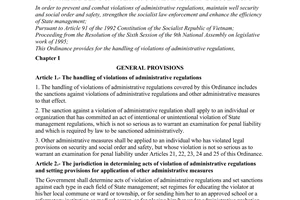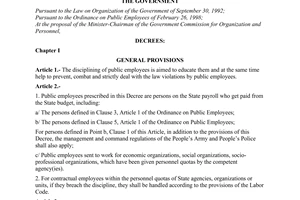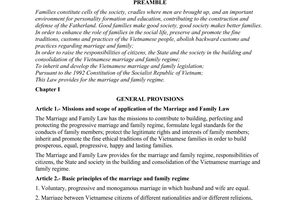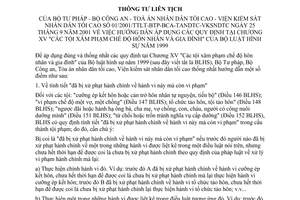Nội dung toàn văn Joint circular No. 01/2001/TTLT-BTP-BCA-TANDTC-VKSNDTC of September 25, 2001 guiding the application of the provisions in chapter XV "crimes of infringing upon the marriage and family regimes" of the 1999 Penal Code promulgated.
|
THE
MINISTRY OF JUSTICE - THE MINISTRY OF PUBLIC SECURITY - THE SUPREME PEOPLE'S
COURT - THE SUPREME PEOPLE'S PROCURACY |
SOCIALIST REPUBLIC OF VIET NAM |
|
No: 01/2001/TTLT/BTP-BCA-TANDTC-VKSNDTC |
Hanoi, September 25, 2001 |
JOINT CIRCULAR
GUIDING THE APPLICATION OF THE PROVISIONS IN CHAPTER XV "CRIMES OF INFRINGING UPON THE MARRIAGE AND FAMILY REGIMES" OF THE 1999 PENAL CODE
In order to correctly and uniformly apply the provisions in Chapter XV "Crimes of infringing upon the marriage and family regimes" of the 1999 Penal Code (hereinafter abbreviated to PC), the Ministry of Justice, the Ministry of Public Security, the Supreme People’s Court and the Supreme People’s Procuracy hereby jointly guide a number of points as follows:
1. Regarding the detail "have already been administratively sanctioned for such acts but repeat their violations"
For the crimes: "Forcible marriage or prevention of voluntary and progressive marriage" (Article 146 of the PC); "Bigamy" (Article 147, the PC); "Organizing underage marriage, entering into underage marriage" (Article 148, the PC); "Ill-treating or persecuting grand-parents, parents, spouses, children, grand-children and/or fosterers" (Article 151, the PC); "Refusing or evading the obligation to provide financial support" (Article 152, the PC), the PC has prescribed the detail "have already been administratively sanctioned for such acts but repeat their violations" in the constitution of crimes; therefore, attention should be paid to:
Being considered "have already been administratively sanctioned for such acts but repeat their violations," if earlier a person had already been administratively sanctioned for one of the acts listed in the above-mentioned articles, has not yet finished the time limit for being regarded as having never before been administratively sanctioned according to the law provisions on handling of administrative violations, but:
a) Commits such act. Example: Earlier, A had been administratively sanctioned for the act of forcible marriage, has not yet finished the time limit for being regarded as having never before been administratively sanctioned but re-committed the act of forcible marriage; earlier, B had been administratively sanctioned for the act of organizing underage marriage, has not yet finished the time limit for being regarded as having never been administratively sanctioned, but re-committed the act of organizing underage marriage; etc.
b) Commits one of the acts listed in such corresponding article. Example: Earlier, A had been administratively sanctioned for the act of forcible marriage, has not yet finished the time limit for being regarded as having never been administratively sanctioned, but committed the act of preventing voluntary and progressive marriage; earlier, B had been administratively sanctioned for the act of ill-treating his wife, children, has not yet finished the time limit for being regarded as having never been administratively sanctioned, but re-committed the act of ill-treating his father, mother; etc.
The conclusion of the time limit for being regarded as having never been administratively sanctioned means the conclusion of the time limit prescribed by the legislation on sanctioning administrative violations. According to the provisions in Article 10 of the 1995 Ordinance on Handling of Administrative Violations, the organizations and individuals that are sanctioned for their administrative violations, if past a year as from the date of completely serving the sanctioning decisions or the date of expiration of the statute of limitations for enforcement of the sanctioning decisions they do not relapse into their violations, they shall be regarded as having never been administratively sanctioned.
2. Regarding the crime of forcible marriage or prevention of voluntary and progressive marriage (Article 146, the PC)
2.1. Forcible marriage means employing all means to force other persons (the male, the female or both) into marriage against their own will.
Prevention of voluntary and progressive marriage means employing all means to prevent the marriage of persons eligible for marriage as provided for by law or committing an act of preventing other persons from maintaining voluntary and progressive marriage or forcing them to break off such marriage bonds.
Acts of forcible marriage, prevention of voluntary and progressive marriage are committed through various means such as persecution, ill-treatment, mental intimidation, property claim or other means.
a) Persecution, ill-treatment means cruel, ill treatment of other persons, thus causing prolonged physical or spiritual pains, such as frequent beating (possibly not causing injuries), detention, forcing them to abstain from eating and drinking, forcing them to stand the cold, scolding, humiliation, etc. in order to force the marriage or prevent voluntary and progressive marriage. It should be noted that acts of persecution and ill-treatment are means of forcible marriage or prevention of voluntary and progressive marriage, hence, no further penal liability examination shall be conducted against the crimes of persecution and ill-treatment prescribed in Article 110 or Article 151 of the PC.
b) Mental intimidation means threatening to harm the lives, health, honor, property or legitimate interests of the intimidated persons, making them to have grounds to really scare, hence have to subdue, such as the threat to set on fire houses, kill relatives, disclose personal lives of the intimidated persons, parents or family members, threaten to commit suicide if the couple marry each other, children threaten to abandon their houses or commit suicide if their fathers or mothers remarry, etc.
c) Property claim means an excessive and unconcessionible claim of property, which is considered one of the conditions for marriage in order to prevent voluntary marriage between a male and a female.
d) Other means may be the forcible departure of one or both parties in order to separate them; the kidnap of the person who does not want to marry the kidnapper in order to force her/him into marriage against her/his own will; the marriage of a person to another person by his/her family against the former’s will in order to separate the former from the person she/he wishes to marry voluntarily; etc.
2.2. The penal liability examination can only be effected against this crime when the offender has already been administratively sanctioned for such act but repeats the violation.
2.3. The subject of this crime may be any person having the penal liability capacity. Usually, the subject of this crime is the male or the female wishing to enter into marriage; the person with certain influence in the family of the male or female (such as grandfather, grandmother, father, mother, brother, sister…); the person with direct impact on the male or female (such as the ex-wife, ex-husband, post-divorce children, old lover,…); the influential person in office (such as the boss, for employees) or belief, religion (such as religious dignitaries, for believers)….
3. Regarding bigamy (Article 147, the PC)
3.1. Living together like husband or wife means any married person lives with another person or any unmarried person lives with another person who he/she knows to be a married person openly or secretly but like a family. The cohabitation like husband and wife is often proved by common child (children) and the couple are considered by neighbors and the society as husband and wife, having common property, who have been educated by their families, offices and organizations but continue maintaining such relationship…
3.2. The penal liability examination can only be effected against this crime in one of the following cases:
a) The bigamous act causes serious consequences which may break up the family of one or both parties, thus leading to divorce, hence suicide by the husband, wife or child, etc.
b) The bigamist had already been administratively sanctioned for such act but repeated the violation.
3.3. In cases where the court has decided to dissolve the marriage or force the termination of co-habitation like husband and wife contrary to the monogamy but a couple continues to maintain such relationship, the offenders shall be examined for penal liability for bigamy according to Clause 2, Article 147 of the PC without being examined for additional penal liability for the failure to execute the judgment according to Article 304 of the PC.
4. Regarding the crime of organizing underage marriage, entering into underage marriage (Article 148, the PC)
4.1. Underage marriage means marrying a wife or husband when either or both parties have not yet reached the marital ages prescribed by the marriage and family legislation.
4.2. Organizing underage marriage means organizing the marriage for persons who have not yet reached the marital ages as prescribed by the marriage and family legislation. The underage marriage organizers clearly know or have grounds to know clearly that either or both persons who they organize the marriage for has (have) not yet reached the prescribed marital age(s). In cases where the organizers do not really know this or get confused about the age bracket, they shall not be examined for penal liability for this crime.
4.3. The offenders can be examined for penal liability for organizing the underage marriage only when they had already been administratively sanctioned for such act but repeated the violation.
4.4. The penal liability examination for underage marriage can be effected only when there appear the following signs:
a) The offenders deliberately maintain the illegal husband-wife relationship with persons who have not reached the marital ages;
b) The court has issued a decision to force the termination of such relationship;
c) The offenders had already been administratively sanctioned for such act but repeated the violation.
4.5. The subjects of the crime of organizing underage marriage may be any persons having the penal liability capacity, but usually grandfathers, grandmothers, fathers, mothers, brothers, sisters or relatives of the male, the female.
The subjects of underage marriage may be any persons having the penal liability capacity and having already reached the marital ages under the marriage and family legislation. According to Article 9 of the 2000 Marriage and Family Law, the marital age for men is 20 or older, the marital age for women is 18 or older.
5. Regarding the crime of registering illegal marriage (Article 149, the PC)
5.1. Registering illegal marriage means that persons responsible for marriage registration certify the marriage (recording in the marriage register and granting the marriage certificates) for the persons who they know are not eligible for marriage according to the provisions in Clauses 1 and 2 of Article 9 or who fall under one of the cases banned from marriage as provided for in Article 10 of the 2000 Marriage and Family Law.
5.2. The offenders shall be examined for penal liability for the crime of registering illegal marriage only when they had already been disciplined for this act and the time limit for wiping out their discipline has not yet expired but they repeat the violation.
According to Clause 2, Article 6 of Decree No.97/1998/ND-CP of November 17, 1998 of the Government on discipline and material responsibility of public employees, the effective duration of discipline for public employees is 12 months as from the date the discipline decision takes effect. Public employees are considered having their discipline wiped out if after 12 months as from the date of issuance of the discipline decisions, they do not relapse into violation and do not commit so serious violations that they must be disciplined, and the competent bodies or units issue decisions to terminate the discipline effect. However, to ensure the interests of the disciplined persons, they shall also be considered having their discipline wiped out if after 12 months counting from the date of issuance of the discipline decisions, they do not relapse into violations and do not commit so serious violations that they are disciplined, though the competent bodies or units have not yet issued decisions to terminate the discipline effect.
For judicial officials of communes, wards or district towns, as the time limit for wiping out the discipline has not yet been prescribed by law, the effective discipline duration shall also be 12 months counting from the date the presidents of the commune, ward or district town People’s Committees issue the discipline decisions.
It should be noted that only cases of "having been already disciplined for this act but repeating the violation" recorded as from July 1, 2000 onward, namely the effective date of the PC, can be examined for penal liability for this crime.
5.3. The subjects of this crime may be persons responsible for marriage registration, concretely:
a) Representatives of the administration or representatives of our country’s overseas diplomatic missions or consulates, who are competent to sign the marriage certificates;
b) Civil status officials who carry out procedures for marriage registration at the commune, ward, district town People’s Committees or officials of the provincial/municipal Justice Services for cases of registering marriage involving foreign elements;
c) Officials carrying out the procedures for marriage registration in Vietnam’s overseas diplomatic missions or consulates.
6. Regarding incest (Article 150, the PC)
6.1. Incest means the sexual intercourse between fathers or mothers and children; between grandfathers or grandmothers and paternal or maternal grandchildren; between siblings of the same parents; between half-brothers and half-sisters.
6.2. To examine penal liability for incest, it is necessary to clearly determine acts of voluntary sexual intercourse without any signs of violence or coercion and with persons aged full 16 or older. Where the act of sexual intercourse between the above-mentioned persons is voluntary, but committed with children aged between full 13 and under 16, the penal liability shall not be examined for incest but for sexual intercourse with children (Point c, Clause 2, Article 115, the PC).
Where an act of incest is accompanied with signs of force, threat to use force, taking advantage of the victims’ defenselessness or other tricks, the offender shall be examined for penal liability either for rape (Point f, Clause 2, Article 111 of the PC) or for rape against children (Point a, Clause 2, Article 112, the PC), depending on each case; if an act of incest is accompanied with signs of taking advantage of the relationship of dependence, thus making the other party reluctant to have intercourse, the offender shall be examined for penal liability for forcible sexual intercourse (Point d, Clause 2, Article 113, the PC) or for forcible sexual intercourse with children ( Point a, Clause 2, Article 114 of the PC), depending on each specific case; in all circumstances where acts of incest are committed against children aged under 13, the incest committers must be examined for penal liability for rape against children ( Point a, Clause 2. Article 112, the PC).
7. Regarding the crime of ill-treating or persecuting grandparents, parents, spouses, children, grandchildren and/or fosterers (Article 151, the PC)
7.1. Acts of ill-treatment, persecution are usually understood as the maltreatment in terms of food, clothing, accommodation in daily-life activities against relatives, such as scolding, forcible abstention from eating, drinking, forcible stand of coldness, worn-out clothing in abnormal ways or acts of violence against victims, such as beating, detention,… thus making the victims suffer from physical and spiritual pains.
7.2. This crime can only be examined for penal liability in one of the following cases:
a) Acts of ill-treatment, persecution cause serious consequences, namely making the ill-treated or persecuted persons always tormented sentimentally, hurt their honor, undergo spiritual sufferings or get injured, damage to their health. The injury or health damage is caused by unintentional faults; if it leads to human death, the offender shall be examined for penal liability for accidentally causing human death (Article 98, the PC).
Where the injury, health damage or human death occurred due to intentional faults, depending on each specific case, the offender shall be examined for penal liability according to corresponding clauses of Article 104 of the PC for intentionally inflicting injury on or causing harm to the health of other persons, or Article 93 of the PC for murder; if making victims writhe so deeply that they commit suicide, the offenders may be examined for penal liability for forcing suicide under Article 100 of the PC.
b) Persons who commit acts of ill-treatment, persecution and have already been administratively sanctioned for such acts, but repeat the violations.
7.3. Objects of infringement prescribed in Article 151 of the PC include:
a) Grandparents, including paternal grandparents and maternal grandparents;
b) Parents, including natural parents, adoptive parents, step fathers, step mothers;
c) Spouses according to the provisions of the marriage and family legislation;
d) Children, including natural children (wedlock children and out-of-wedlock children); adopted children, sons-in-law; daughters-in-law; children of previous marriages of the husband or wife;
e) Grandchildren, including paternal grandchildren, maternal grandchildren;
f) Fosterers means brothers, sisters, aunts, uncles, next of kin or other persons who fostered or are fostering the persons who have committed in-treating or persecuting acts.
It should be noted that only cases of ill-treating or persecuting the subjects mentioned above shall be examined for penal liability for this crime; if the ill-treating or persecuting acts are committed against persons other than the above-mentioned subjects, the offenders shall be examined for penal liability for the crime of ill-treating other persons according to Article 110 of the PC; where the ill-treating or persecuting acts constitute means of forcible marriage or prevention of voluntary and progressive marriage, the offenders shall be examined for penal liability for crimes of forcible marriage or prevention of voluntary and progressive marriage according to Article 146 of the PC.
8. Regarding the crime of refusing or evading the obligation to provide financial support (Article 152, the PC)
8.1. The obligation to provide financial support means a person’s duty to contribute money or other property to meeting the essential needs of the person having marital, blood or fostering ties under the provisions of the marriage and family legislation.
According to Articles from 50 through 60 of Chapter VI of the 2000 Law on Marriage and Family, the obligation to provide financial support is implemented between:
a) Husband and wife;
b) Father, mother and children;
c) Paternal grandparents, maternal grandparents and grandchildren;
d) Brothers, sisters of the common parents.
8.2. Having the practical capability to fulfill the financial support obligation means the persons with obligation to provide financial support have money, property or incomes, which can ensure their family life at the local average level.
8.3. Acts of evading or refusing the obligation to provide financial support are usually manifested through the refusal to contribute money or property for financial support though having the practical capability to fulfill such obligation.
8.4. The crime of refusing or evading the obligation to provide financial support can be examined for penal liability only when there appear all the following signs:
a) The offenders must be the persons having the obligation to provide financial support under the provisions of the Marriage and Family Law;
b) The offenders have refused or evaded the obligation to provide financial support;
c) The refusal or evasion of the obligation to provide financial support causes serious consequences (namely making the persons entitled to the support fall into the dangerous situation threatening their lives or health, such as ailment, diseases, etc). Though serious consequences have not yet been caused, the offenders had already been administratively sanctioned for this act, but repeated their violations.
8.5. In the process of investigation, prosecution, trial of this crime, it should be noted that if the court has already issued the judgments or decisions, forcing the persons with the obligation to provide financial support to fulfill their obligation, but such persons deliberately refuse to execute them even though necessary coercive measures were already applied, such persons shall be examined for penal liability according to Article 304 of the PC for failing to execute judgments.
9. Implementation effect of the Circular
This Circular takes effect as from October 10, 2001.
In the course of implementation, if any problems arise or additional explanations and/or guidance are needed, they should be reported to the Ministry of Justice, the Ministry of Public Security, the Supreme People’s Court and the Supreme People’s Procuracy for timely additional explanations or guidance.
|
FOR THE JUSTICE MINISTER |
FOR THE MINISTER OF PUBLIC
SECURITY |
|
FOR THE CHIEF JUDGE OF THE
SUPREME PEOPLE’S COURT |
FOR THE
DIRECTOR OF THE SUPREME PEOPLE’S PROCURACY |




